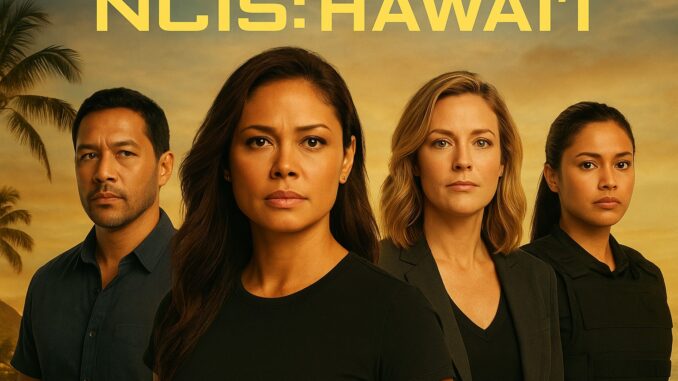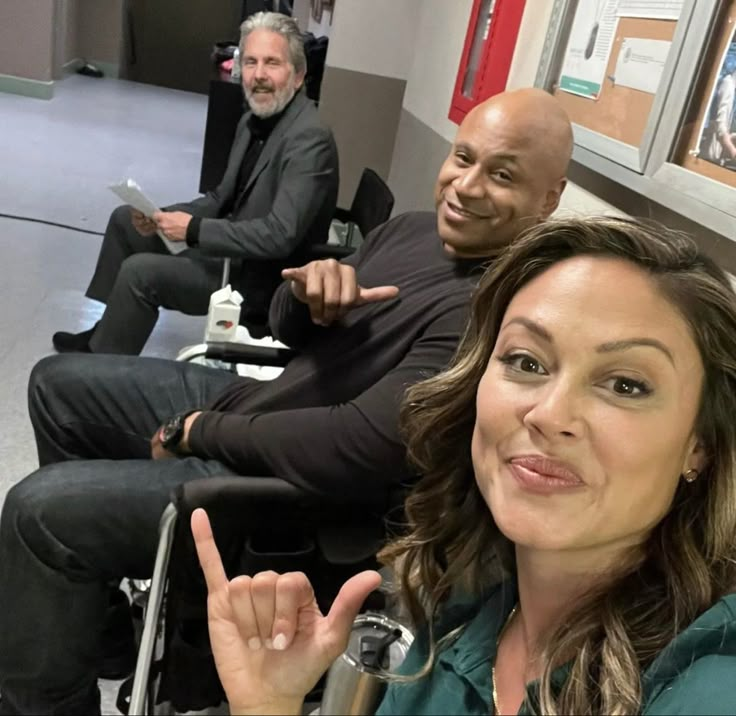
The flagship NCIS series is off to a good start this network cycle. That is, until Season 23 revived a storyline that worsened the cancellation of its spinoff, NCIS: Hawai’i, a year after it ended. In NCIS Season 23’s two-part premiere, the flagship delivered one of its most gripping cliffhangers in years, with Alden Parker (Gary Cole) finding himself on a doomed ship called the Quentin amid the hunt for Carla Marino (Rebecca De Mornay) with his sister Harriet (Nancy Travis), holding his life in her hands.
Parker made it out alive, saying goodbye to his father, Roman (Francis X. McCarthy), at the end of Episode 2. The life-or-death story continued pushing Parker’s background to the foreground, bringing in his sister and father as he unravels the mystery of his mother’s death. Still, other stories are beginning to take form. Director Leon Vance (Rocky Carroll) pulls Nick Torres (Wilmer Valderrama) and Jessica Knight (Katrina Law) for side projects, with one of the ops stepping on the recently canceled NCIS: Hawai’i.
It’s been a year since CBS blindsided fans by canceling NCIS: Hawaiʻi after just three seasons. But as the dust settles, the pain hasn’t eased — in fact, CBS’s decision is looking worse than ever. Between cliffhanger endings, lost representation, and a production crisis in Hawaii, what seemed like a premature finale at the time now carries weighty consequences. Let me walk you through what really happened, why fans are still outraged, and how this cancellation left a deeper wound.
Background: The Rise and Fall of NCIS: Hawaiʻi
A New Spin-Off with Big Ambitions
-
NCIS: Hawaiʻi launched in September 2021 as a fresh addition to the NCIS franchise.
-
It starred Vanessa Lachey as Jane Tennant, the first female Special Agent-in-Charge in the NCIS universe.
-
The show combined crime procedural drama with the beauty of the Hawaiian setting and a tight-knit team investigating military and national-security threats.
Season 3 & Abrupt Cancelation
-
Season 3 of NCIS: Hawaiʻi premiered on February 12, 2024, but only ran for 10 episodes, making it the show’s shortest season.
-
On April 26, 2024, CBS announced it was canceling the show after three seasons.
-
The season finale, aired on May 6, 2024, became the series finale — but many felt it lacked proper closure.
Why the Cancelation Was Such a Shock
High Emotions from the Cast
-
Vanessa Lachey publicly expressed being “gutted, confused, blindsided.”
-
She lamented on social media that she and the cast never got a “proper goodbye.”
-
Tori Anderson (Agent Kate Whistler) called the cancelation “a huge loss for representation.”
Fan Outrage and Unresolved Cliffhangers
-
Fans criticized CBS for ending Season 3 on a major cliffhanger, leaving key storylines dangling.
-
Some viewer campaigns — like Change.org petitions — attempted to revive the show.
-
On Reddit, viewers openly questioned why a show with millions of viewers was cut, with one thread saying:
“They filmed the end of the season before knowing they wouldn’t have another season.”
Reasons Behind CBS’s Decision — And Why Fans Say It’s Not Good Enough
Official Explanation from CBS
-
CBS cited financial costs, ratings performance, and its 2024–2025 programming lineup as reasons.
-
Network executives told TheWrap and TheWrap reported that they had to “make some really tough choices” to keep the schedule fresh.
-
According to CBS leadership, NCIS: Hawaiʻi’s cancellation allowed room for new NCIS content, including the upcoming prequel NCIS: Origins.
Fans Argue the Cost Is Not Just Financial
-
Some argue CBS undervalued the show’s importance for diversity — Jane Tennant broke ground as a female, mixed-heritage lead.
-
The relationship between Lucy Tara and Kate Whistler (the “Kacy” ship) was rare LGBTQ+ representation in a major procedural franchise.
-
Reddit users speculated that Hawaii production costs were too high for CBS’s liking:
“Mostly because Hawaii is very expensive to film in … They likely didn’t see a return on their investment.”
The Fallout in Hawaii: More Than Just a TV Show Ending
Economic Blow to Local Production
-
The cancellation wasn’t just a creative loss — it hit Hawaii’s television production economy hard.
-
Jason Antoon (cast member) shared a sad video of overgrown weeds at Hawaii Film Studio, a symbol of lost jobs and opportunities.
-
With NCIS: Hawaiʻi gone — and other series canceled — no major TV show is filming in Hawaii, a first in over 20 years.
Representation Matters — But It Was Cut Short
-
For many, NCIS: Hawaiʻi wasn’t just another crime series; it showed a powerful, diverse female lead in a traditionally male-led procedural.
-
The Kacy relationship (Lucy and Kate) was one of the few dedicated LGBTQ storylines in the NCIS universe.
-
The cast and fans alike saw the cancelation as a regression — as Tori Anderson put it: “a huge loss for representation.”
Cliffhangers, Unanswered Questions & “What Could Have Been”
The Final Episode’s Loose Ends
-
The finale revealed Maggie Shaw, Jane’s mentor, sitting in Jane’s house — but offered no real resolution.
-
The bioweapon plot built up over Season 3 felt like it was gearing toward a larger arc, only to be left hanging.
-
Fans and cast thought another season was coming — so the lack of closure stung. Vanessa Lachey admitted she wished for a proper goodbye.
The Revival Campaign That Never Took Off
-
Despite petition efforts (e.g., “Save NCIS: Hawaiʻi on CBS”), CBS reportedly refused to reverse its decision.
-
CBS executives have said budget and scheduling concerns make a revival unlikely.
-
While other series (like S.W.A.T.) got extra chances, fans felt Hawaiʻi didn’t receive the same consideration.
What CBS Could Have Done Differently
Option 1 — Move It to Streaming
-
Fans hoped for a move to Paramount+, where CBS has shuttled other spinoffs.
-
But CBS execs said shifting it was financially unfeasible: they don’t just have unlimited streaming slots.
-
If budget was the problem, a leaner production model could’ve kept the show alive in digital form.
Option 2 — Negotiate Production Costs
-
The high cost of filming in Hawaii was often cited.
-
CBS could have renegotiated tax incentives or pushed for local partnerships to ease the burden.
-
Alternatively, reducing episode count (as they did in Season 3) might have stretched the budget — but at what cost to storytelling?
Option 3 — Use the Story Momentum
-
The show ended on a cliffhanger — a classic sign there was more story to tell.
-
CBS might have greenlit a wrap-up special, a mini-series, or a movie to tie up loose threads.
-
That way, even if the series ended, characters got closure, and fans weren’t left in limbo.
Why the Cancelation Still Resonates — Even a Year Later
Emotional Impact on Fans & Cast
-
Many fans still feel personally connected to Jane Tennant, Lucy Tara, and the rest of the team.
-
The sudden end felt like a betrayal to viewers who invested their time — and heartbreak — into the characters.
-
Vanessa Lachey’s heartfelt posts reflect how deeply the cancelation hit the people behind the camera, too.
Symbolic Loss for Diversity on Network TV
-
In an era where representation matters more than ever, losing a female-led, diverse, and inclusive procedural was a blow.
-
NCIS: Hawaiʻi broke new ground: a woman of color in charge, a gay relationship, and a multiethnic ensemble.
-
The cancelation is being viewed as a step backward — not just for fans of the show, but for what the show represented.

The Ripple Effect on Hawaii’s Film Industry
-
The show’s end had real economic consequences: jobs lost, studios idled.
-
Local talent and crew were deeply impacted — and the absence of productions continues to be felt.
-
The overgrown film studio is now a metaphor for lost opportunity, not just for a TV show, but for an entire creative hub.
Can NCIS: Hawaiʻi Make a Comeback?
Call-Out for Fan Campaigns
-
Fans could try reigniting interest via social media — reminding CBS or streaming partners of the show’s value.
-
Renewed petitions, trending hashtags, or influencer campaigns could pressure decision-makers.
-
But realistically, CBS’s public stance suggests a comeback is unlikely without a major shift.
H3: Alternative Platforms
-
Paramount+ remains the obvious candidate — but so far, CBS has resisted re-homing the series.
-
International platforms (outside the U.S.) might be interested in licensing or reviving the show.
-
Independent production companies could approach former cast for a limited run, though that would require significant funding.
Lessons for Networks: What This Cancelation Teaches Us
Representation Isn’t Just a Checkmark
-
Diverse stories need long-term support, not just token seasons.
-
Cancellation of underrepresented shows can send the wrong message — even if it makes financial sense.
Budget vs. Heart — The Balancing Act
-
Networks must balance production costs with creative ambitions. But canceling a show solely on cost can backfire in reputation.
-
Strategic decisions about where to invest should account for more than just immediate ratings — impact matters.
Listening to the Audience
-
CBS missed an opportunity: fan petitions and social campaigns showed deep engagement.
-
Sometimes, fan passion can translate into revenue, but only if the network recognizes it.
Conclusion
A year ago, NCIS: Hawaiʻi was abruptly canceled — leaving not just a TV series in limbo, but a community of viewers, cast, and crew feeling betrayed. Now, looking back, CBS’s decision seems even more short-sighted. The cancellation wasn’t just about ratings or cost: it was about ending a groundbreaking chapter in the NCIS universe, erasing representation, and disrupting a local industry. The show’s legacy lives on in its fans, but the studio lot in Hawaii? That’s a daily reminder of what we’ve lost.